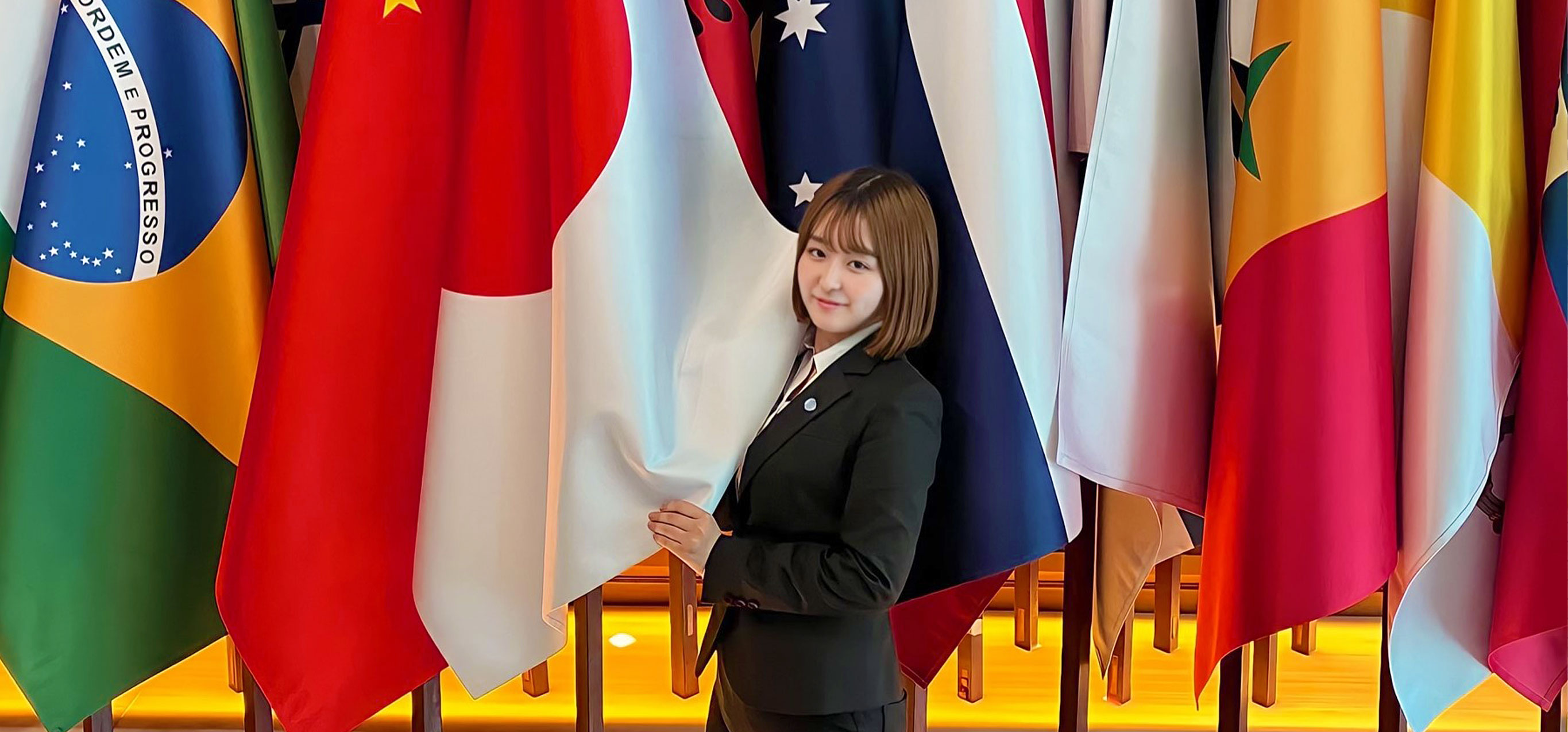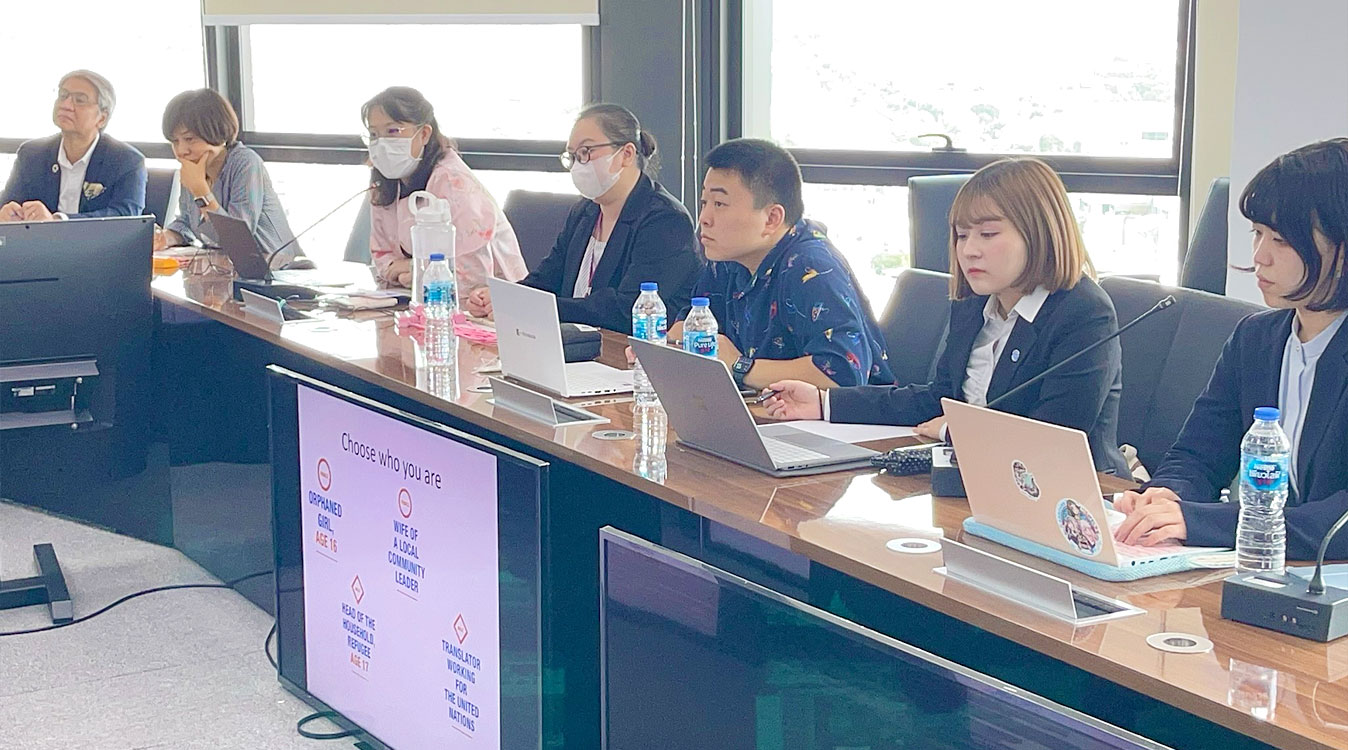
As someone who aspires to work for a United Nations organization, I found participating in the Thai Bangkok Training Program to be a very inspiring experience because I was able to become more familiar with the issues involved.
SATO Sumi
Fourth-year International Relations Major
SATO Sumi, a fourth-year student who is close to graduation, aspires to work for the United Nations and is participating in a United Nations Development Programme (UNDP) internship. We interviewed her about her experience in the Thailand Bangkok Training Program, where she learned about the role of government and international organizations.
Please tell us what motivated you to participate in the 'Thailand Bangkok Training Program'.
SumiI aspire to work for a United Nations organization in the future, and this was a very good opportunity to be briefed on how relevant ministries and UN organizations in Southeast Asia are taking concrete actions to achieve their SGDs.
Please tell us about some of the key things or highlights that you took away from the program.
SumiI was impressed by the briefings from various organizations regarding their efforts to achieve SGDs, from high-level down to local-level. In Thailand, where inequality and disparity are major issues, the briefing was a very good opportunity for us to hear from people who are actually involved in various roles and to get a comprehensive view of the issues that are rooted in society.
One thing that really struck me at ESCAP (United Nations Economic and Social Commission for Asia and the Pacific) was the innovation in green transportation. I was particularly interested in this area because it is one that the entire United Nations is focusing on to achieve its SDGs. However, after spending time in Thailand, I felt that the level of development was still low compared to Japan and that successfully achieving SDG 13 was still a long way away. Despite the development of subways and highways, there was little concern for the environment at the local level, and I felt the need for further regional efforts in terms of eliminating inequalities.
Our UNHCR (United Nations High Commissioner for Refugees) meeting was an excellent opportunity to gain some insights from a specialist in my own field of study, the Democratic Republic of the Congo. Because this person is active in the field, they were able to present the UNHCR's efforts regarding internally displaced persons using a wide variety of concrete examples. This helped us better understand the situation. The workshop was also a good chance for me to devise my own project to help the Rohingya people and internally displaced persons in the Congo and to think about how the UNHCR needs to, from a neutral position, gather support.
The Thai government agencies have different priorities from those of the UN, and we were briefed by officials from agencies that are working on a more local level, which helped us to develop a multifaceted perspective. At the Ministry of Foreign Affairs, which is of interest to me, we were briefed by an outstanding current staff member and two retired staff members. They discussed not only Thailand's regional SDG efforts but also development cooperation in Southeast Asia and ASEAN, as well as Japan's Ministry of Foreign Affairs and JICA. This provided us with a comprehensive understanding of development cooperation in Asia as a whole. Again, it was an excellent chance for me to visit not only the UN but also other government organizations in Thailand.
In addition, this was a wonderful occasion to discuss SDGs with students from Chulalongkorn University. I enjoyed having the opportunity to speak frankly about not only each university's approach to SDGs but also in-depth about other topics as well. It was also a good chance to bring young people from Thailand and Japan together through cultural exchange, including conversations about politics and Thai culture.

Please tell us what you would recommend to other students about this program.
SumiThat would have to be the valuable chance to be one of the people with whom our professor shares her excellent connections and career experiences and to have her help us as we develop our career paths. There are a wide variety of possible work roles for United Nations officials, and until you have a chance to actually work there, it is difficult to imagine in what capacity you would like to be involved with the UN. I believe that actually visiting the United Nations and interacting with various officials can have a very positive impact on career path decisions for those hoping to work for the UN. Being an intern at the United Nations, I believe that one's personal network is extremely important there, so I suggest making this program part of your networking efforts.
How would your experience in this program influence your future plans?
SumiIn this program, I realized the importance of fieldwork. Although I had had the opportunity to learn about SDGs in Japan, I still did not feel that I was familiar with them. And being from a country that has attained a certain level of development, I had not had many opportunities to develop an awareness of issues on a global scale. I was able to do fieldwork in Thailand in locations where there were large inequalities and regional disparities. Although Thailand is considered to be beyond the scale of a developing country, it still allowed me to become more familiar with issues concerning SDGs. Visits to the UN as well as Thai government agencies enabled us to learn about SDG initiatives in Southeast Asia, in addition to initiatives at the local level in Thailand, while helping us develop a holistic perspective.
This program reminded me of my desire to work for the United Nations, an organization that works for the global good. Now, I am an intern in the United Nations Development Program in Tokyo, and I find my current work for the UNDP very rewarding. In addition, I have been quite inspired by the many wonderful staff members at the UN who have great careers, serve as role models, and provide me with advice regarding graduate school and beyond. Furthermore, there are some UN officials who are also graduates of the Ritsumeikan College of International Relations. So, hopefully, participation in this program will provide a chance for those who are interested, even if only a little, in working for the UN as a career path to think in concrete terms. I really appreciate Professor Sachiko Ishikawa and everyone at the College of International Relations administrative office for organizing this program.
January 2024
MORE INTERVIEWS
-
Bridging Japan and the US through International Relations and Language – My Four Years in the JDP and My Global Future
INADA Mimi
Fourth-year Joint Degree Program (RU-home)2025.2.25
studentlife|academics|studyabroad|jdp|
-
While technical knowledge and job-required skills can be learnt after being on the job, some skills, such as communication, presentation, data analysis, and visualization, are the skills I was able to learn from my time at Ritsumeikan.
Pranjal Modi
RIMOWA (Global Studies Major Alumnus 2022)2025.2.4
alumni|
-
Zemi Research Convention 2024“The Integration of Human Rights into International Environmental Law and its Implications”
Ochi Seminar
(team name: Environmental Justice Analysts)2025.1.6
academics|openseminar|
-
Zemi Research Convention 2024“Are Israel's actions in Palestine considered self-defence”
Ochi Seminar
(team name: The Prosecutors)2024.12.25
academics|openseminar|
-
This supportive community empowers you to step out of your comfort zone and take on numerous challenges throughout your university life.
SUZUKI Tomoya
SAP (International Relations Major Alumnus 2018)2024.12.11
alumni|
-
Surrounded by diversified nationalities of colleagues and external business relationships, this was essentially similar to what I experienced while studying in the College of International Relations.
Joyce Lo
Mindshare (Global Studies Major Alumnus 2017)2024.12.10
alumni|